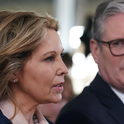What you hear about the prime minister’s fiancée Carrie Symonds will depend on who you talk to. To one political camp she is a victim of sexist briefings to the media, a supportive partner to Boris Johnson and an ardent campaigner for animal rights. To the other she is Lady Macbeth or “Princess Nut Nut”—apparently an attempt to imply she is both spoiled and insane—using her influence with the PM to ensure her allies are hired and her enemies are fired. This March saw a brouhaha over reports that Tory donors had secretly paid for a makeover of the Downing Street flat—a project Symonds is supervising.
Prime ministers’ partners are always subject to criticism—it’s not a role formally defined in our constitution but it nevertheless comes with very specific expectations. You must support but not influence. You must make the most of your power (does your charity work make enough of a difference?) but never be seen to “wield it.” Symonds’s history as a top political adviser—she was head of communications for the Conservative Party—introduces new double-binds. She’s credited with sharpening up Johnson’s act, even for getting him into No 10. But her network of allies, and interest in the comings and goings of Downing Street, attract suspicion—as does the perception that she nurses enmities as well as friendships.
Symonds was born in 1988 after an affair between Matthew Symonds, who co-founded the Independent, and Josephine McAfee, a lawyer at the paper—her father was largely absent during her childhood. She was educated at the private Godolphin and Latymer school and then Warwick University, where she read art history and theatre studies. In 2007 the serial sex offender and taxi driver John Worboys offered her a lift home—she woke up at home the next day with no memory of what had happened. She bravely gave evidence against him at Croydon Crown Court, and was later part of a successful campaign against his early release.
She had hopes of being an actress but turned to PR, and rose quickly, becoming a Conservative press officer: Johnson and Michael Gove came to her 30th birthday party. She had campaigned for Leave—not an obvious career move at the time, but one which would put her in prime position for the coveted head of comms role.
Her affair with Johnson began a year later. She left her comms job (questions over unauthorised expenses later became public) and Johnson was soon living with her, after his then-wife Marina kicked him out. During the leadership election, a shouting match with Johnson over some spilled wine drew the attention of first neighbours, then the police, then Fleet Street. She moved into Downing Street after 2019’s Christmas election, and then news came that she was expecting a baby.
The debate over just what Carrie’s influence might be on the day-to-day running of Downing Street came to a head when Lee Cain and Dominic Cummings left No 10 late last year. They were longstanding rivals known for power play and both were turfed out amid reports Symonds had taken against them. Symonds’s choice for Johnson’s official press secretary was Allegra Stratton: she was duly appointed despite reportedly being outshone at interview. Unlike, say, Philip May, whose brain his wife Theresa would pick during rambles through the countryside, Symonds has obvious motives beyond simply being supportive—political allies to keep on side, causes to champion and enemies to defeat.
Detractors claim she stomps around issuing orders; allies say she is in an impossible position: her political background will make her the subject of suspicion whatever she does. And what happens in No 10 is ultimately Johnson’s call: it’s for him to decide who has influence over him and who does not. It’s also undeniable that the government has looked much more competent of late and has moved ahead in the polls. If Carrie has indeed been pulling the strings, perhaps others in Downing Street should let her get on with it.













